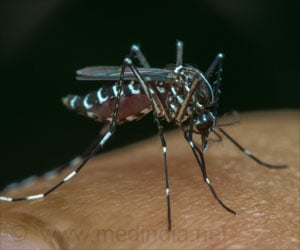Highlights
- Malaria is a serious illness that is caused by Plasmodium and spread by female Anopheles mosquito.
- Spraying the hormone dibenzoyl hydrazine (DBH) could disrupt the life cycle of the mosquito and prevent the spread of the parasite Plasmodium.
- Mosquitoes that became resistant to pesticides could be controlled by the use of this hormone, promising better control.
Malaria is a disease caused by mosquito-borne parasite Plasmodium, and it results in the development of fever, chills with flu-like symptoms. In 2015,
- 214 million new cases were identified
- 438,000 people died due to malaria
- 1500 new case are detected in the U.S every year
There are concerted efforts by both public and Government organizations to prevent the spread of disease by spraying pesticides. However, mosquitoes are becoming increasingly resistant to these chemicals, necessitating a better method of control.
Disrupting the Ability to Transmit Parasite
Flaminia Catteruccia and colleagues from The Harvard Chan School of Public Health aimed at disrupting the ability of the mosquito to transmit the parasites.
The adult female Anopheles gambiae which are the prime vectors for the malarial parasite in Sub-Saharan Africa were exposed to a chemical called DBH. The hormone DBH is found to affect the activity of the hormone 20-hydroxyecdysone that is important for many important essential biological processes associated with the mosquito.
- Shortening of the lifespan of the mosquito
- Reduction in the number of mosquito eggs produced
- Does not allow successful mating of the mosquitoes
- Development of the Plasmodium parasite is blocked
Malaria is a serious condition and the Centre for Disease Control (CDC) states that nearly 3.2 billion people are at high risk for the disease as they live in areas where the mosquito spreads. 106 countries are considered to be high risk while the United States completely eradicated malaria in the early 1950s. The incidence of malaria in the U.S is associated with travelers and immigrants who visit malaria endemic areas for a holiday.
- Mosquito Nets for Windows - Doors, windows and beds are protected with mosquito nets that prevent the entry of mosquitoes. However, accidental entry due when doors or windows are opened results in the entry of mosquitoes and spread of disease.
- Preventing Stagnation of Water - Stagnant water leads to mosquito breeding and increase in numbers. However, in Tropical regions and in rainy seasons, it is difficult to prevent the stagnation of water.
- Pesticides - Pesticides are routinely sprayed on to reduce the number of mosquitoes. However, many mosquitoes are found to be resistant to these pesticides and continue to flourish.
The current study that utilizes a hormone which affects the life cycle of a mosquito and which prevents the development of the parasite Plasmodium could prove to be effective in mosquito numbers and, thereby, infection rates.
References:
- Malaria Facts - (https://www.cdc.gov/malaria/about/facts.html)
- What Is Malaria? - (https://www.malarianomore.org/pages/what-is-malaria)















